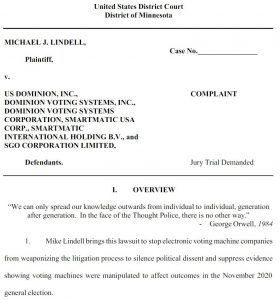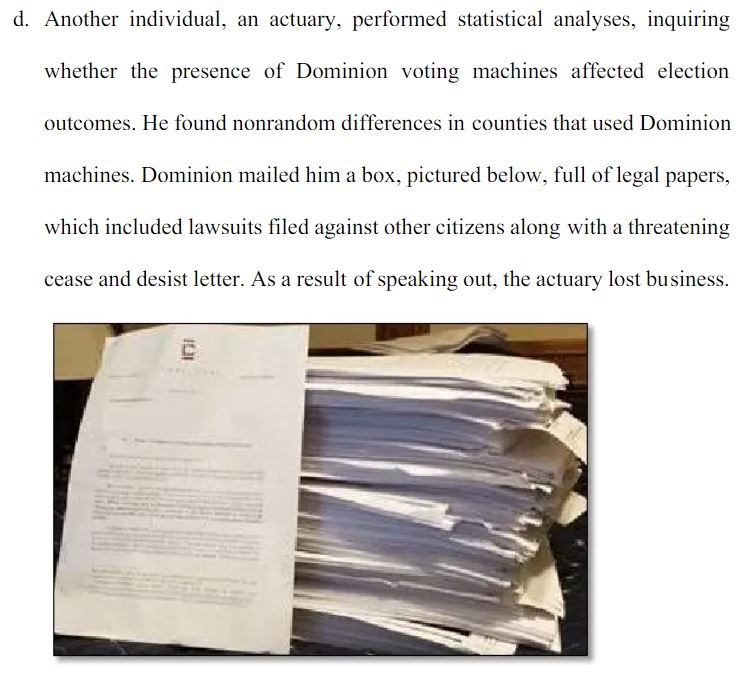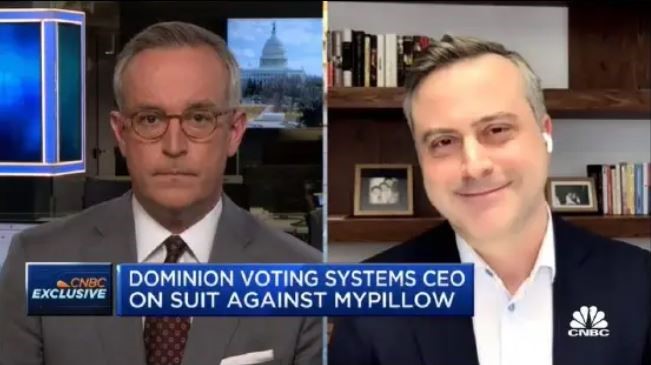Plaintiff's June 3, 2021 filing that initiated the Lindell v. Dominion/Smartmatic case is comprised of the Complaint and 17 exhibits. This article summarizes the initiating Complaint. The full series of articles is available through the following links: Intro | Complaint Summary | Exhibits 1-4 Breakdown | Exhibits 5-7 | Exhibits 8-9 | Exhibit 12 | Exhibits 10-11 & 13-17.
Michael J. Lindell v. U.S. Dominion, Inc., et al. Complaint
 A legal 'Complaint' is a document filed with a court that functions to initiate a lawsuit and inform the court and the Defendants of Plaintiff's intent. It offers a summary of 'facts' that aim to establish the necessary elements of the claim for relief that a Plaintiff is asserting. These 'facts' exist as to allegations against the Defendants, pending supporting evidence that will be brought forth in trial to be considered by the judge and/or jury.
A legal 'Complaint' is a document filed with a court that functions to initiate a lawsuit and inform the court and the Defendants of Plaintiff's intent. It offers a summary of 'facts' that aim to establish the necessary elements of the claim for relief that a Plaintiff is asserting. These 'facts' exist as to allegations against the Defendants, pending supporting evidence that will be brought forth in trial to be considered by the judge and/or jury.
The Complaint filed to start Lindell v. Dominion is more readable than a typical lawsuit in both vocabulary and style. Dystopian quotes are interspersed from George Orwell's "1984," E.M. Forster's "The Machine Stops," and other famous literature. In it, Plaintiff Lindell alleges that evidence has been suppressed that would show Defendants' machines were manipulated to affect the November General election results.
Lindell claims that the Defendants' lawsuits and legal demands against him amount to a weaponization of law or LawFare (Law + Warfare). He says they are essentially government because of their role in elections administration, so it is a violation of his first amendment rights to intimidate and try to silence him.
https://www.scribd.com/document/510570991/Lindell-v-Dominion-Et-Al-Smartmatic-Complaint-Electronic-Voting
One statement of 'fact' offered by the document reads,
"It is indisputable that the electronic voting machines and software manufactured and sold by Dominion and Smartmatic are vulnerable to cyberattacks before, during, and after an election, and in a manner that could easily alter election outcomes."
In support of this claim, it points to testimony from Vice President Kamala Harris prior to the 2020 election when she was a California Senator and testimony by University of Michigan professor and election security expert J. Alex Halderman on June 21, 2017. It also offers as fact the existence of "Direct and circumstantial" evidence that "electronic voting machines like those manufactured and sold by Dominion were manipulated and hacked in a manner that caused votes for one candidate to be tallied for the opposing candidate."
Lindell states as fact that Dominion has:
"Weaponized the legal process and intimidated witnesses to election fraud by suing or threatening to sue over 150 private individuals or organizations," and that "Smartmatic has engaged in similar... merely for publicly sharing information they have gathered regarding vulnerabilities in, and attacks on, electronic voting machines in the 2020 General Election."
It notes that Dominion sued Lindell in federal court in Washington, D.C., even though neither party resides there, and it says D.C. is "outside the jurisdiction where Lindell made the vast majority of the statements Dominion complains about."
To support the allegation that Plaintiff Lindell's First Amendment rights have been violated, it is argued that voting machine companies like the Defendants' are "state actors by virtue of their roles running elections," which it calls an essential state function and because they "provide election equipment and run elections for government agencies." It further argues that the First Amendment guarantees the right to "express political dissent and espouse beliefs without fear of intimidation, suppression, or punishment from state actors."
It then argues that the cease & desist and notice of defamation suit sent to Lindell in response to his going public with information claimed to demonstrate voting machine vulnerabilities amounted to suppression and intimidation of his political speech. Therefore, the suit claims, the state is violating his First Amendment rights via the Defendants' voting machine companies.
The complaint goes on to reference the Maricopa County, Arizona audit in progress led by CyberNinjas, noting that it is the fourth most populous county in the United States and includes an audit of Dominion's voting machines there. It says that the Maricopa County Board of Supervisors and "various Democrat-affiliated groups" have attempted to "thwart or obstruct," including "refusing to turn over routers to which the Dominion machines were connected and which will show details regarding the Dominion machines' connectivity to the internet." It also states that "Maricopa County officials have... admitted they do not possess the administrative passwords to the Dominion voting machines – meaning Dominion employees had control over the election," and that Dominion "joined the Democrat-led chorus to smear the audit."
Theorizing on the incentive behind observed and claimed actions by the Defendants', the complaint reads,
"Dominion, Smartmatic, and others are desperate to cover up gross security flaws in their electronic voting systems—and information showing cyber attacks and hacking in the November 2020 election—by uniting in a common purpose to use the litigation process to attempt to suppress the revelation and public discussion of these truths."
To underscore Lindell's belief in the importance of a favorable judgment, the document offers that "lawfare" "must be stopped before it is allowed to gain a toehold of acceptance in the U.S. judiciary." It urges relief before courts are made "yet another weapon for wealthy corporations and the powerful politicians they support to silence speech and ideas they deem unacceptable to their narrative."
The complaint promises evidence in trial that elections were relatively secure and auditable when they were paper-based but that by 2020 "[A] small handful of available private election management systems... provided by a small number of private companies having little to no transparency to the public" were used in most elections, due to enactment of the 2002 Help America Vote bill. Now, it says:
"A total of five (5) companies conduct and administer elections for more than ninety percent (90%) of counties in the United States: (1) Election Systems & Software, (2) Dominion Voting Systems, (3) Smartmatic USA Corp., (4) Hart InterCivic, and (5) Tenex."
It further claims that "all these providers' electronic voting machines and election management systems are vulnerable to hacking, as has been published and presented to various congressional committees," and says they can all be or are designed to be, connected to the internet directly or indirectly.
It goes on to claim that the "small handful of election night reporting systems... owned and controlled by Scytl, GCR, VR Systems, and Arikkan" depend on the internet for vote count transmission. "In short, over the last two decades, the United States has transitioned from a safe, secure, auditable paper-based system... to an inherently vulnerable, internet-exposed electronic voting machine-based system."
Further, the suit argues that there is even less competition among electronic voting machine companies than it appears. Dominion and Smartmatic share:
"Many things in common—including an intertwined corporate history and a shared 'DNA' of election management system software and hardware" as well as a "common purpose of using litigation and 'lawfare' to silence any who would publicly criticize the security flaws in their voting machines and systems or attempt to inform the public about the role of those flaws in undermining the integrity of the 2020 presidential election."
It outlines the histories of the two companies and calls them "inextricably intertwined" in both "acquisition of legacy hardware and software technologies" and in "cross-pollenization" of personnel, saying that "helps to explain their coordinated actions."
The lawsuit claims to show relevant ties to private equity firm Staple Street Capital, global investment firm The Carlyle Group, UBS Securities LLC, Chinese banks and corporations, and the Chinese government. "...by the time of the 2020 election, Chinese government-related entities, Chinese technology companies, and powerful Chinese financial interests had direct or indirect ownership of and near-total access to Dominion's and Smartmatic's voting machine technology."
Suspicions and/or actions against Dominion Voting Systems or elections involving them that have been made public from U.S. States, including Texas, Arizona, New Hampshire, Georgia, and Michigan are referenced. One such case is when the Texas Secretary of State's office denied certification of the Dominion Democracy Suite 5.5 system, as shown in Exhibits 6 and 7 of the Lindell v. Dominion lawsuit.
The October 11, 2020 decision from Judge Amy Totenberg in Exhibit 5 is quoted, in which it says she:
"Issued an order regarding the Dominion voting system's security risks and the potential for fraud or irregularities," and "found substantial evidence that the Dominion system was plagued by security risks and the potential for votes to be improperly rejected or misallocated."
Lindell's lawsuit makes the claim that "for many years serious security and technology problems have dogged Dominion's election machines and systems" and lists history going back to 2003. This history includes Dominion's purchase of Premier (formerly Diebold) from ES&S and a case in which "it was discovered that Diebold had left approximately 40,000 files that made up its foundational e-voting security software code, GEMS, entirely unprotected on a publicly accessible website." It goes on to mention various studies and vulnerability assessments that have since been published, including those in Exhibits 1 & 2.
NBC News and CNNTech reporting prior to the 2020 elections are alleged to show "that hackers can target voting systems with ease," and that in one case, "Dominion refused to respond to CNNTech's request for comment about its hackable voting machines," even while former security advisor for the Obama administration and organizer of the DEF CON hacking conference said, "...the 2020 election will be hacked no matter what we do."
The January 2018 Final Report from the Nancy Pelosi formed Task Force on Election Security that is in Exhibit 8 is sourced for support, saying it "identified the vulnerability of U.S. elections to foreign interference." It includes former FBI Director James Comey's testimony in which he expected interference from Russia in future elections. It also includes reference to the Brennan Center report, partially funded by Soros/Open Society Foundations, in Exhibit 9. That report, it says, contains "two and a half pages of... issues with voting machines."
Lindell's suit further claims that "Dominion refuses to provide access to experts to forensically investigate its 'proprietary' software, machines, and systems, to further establish that its machines have been hacked," and says that is "telling in and of itself" in that it means "Dominion denies the public access to the evidence to substantiate" claims that would be exculpatory for Defendants of Dominion's defamation suits.
Part D., "Gaslighting: The REAL Big Lie," begins by noting that the Department of Homeland Security (DHS) Cybersecurity and Infrastructure Security Agency (CISA) had published claims that the 2020 election was the "most secure in American history," but points out that Dominion is a member of CISA's Election Infrastructure Sector Coordinating Council, which it says gives them "self-serving influence over CISA's proclamations." It notes that Dominion "forced unplanned and unannounced software uploads into its machines" on the night before the 2020 election and that Dominion "publicly denied that any such updates... were made and that its machines were connected to the internet," calling both statements false.
 Screenshot of Page 44 of Lindell v. Dominion / Smartmatic Complaint
Screenshot of Page 44 of Lindell v. Dominion / Smartmatic Complaint
The complaint then extensively references data from scientist Douglas G. Frank Ph.D. and his work analyzing elections. He says he found an algorithm operating that is proof of non-random results. It says that the algorithms shift votes based on demographics in the state and have been found in Minnesota, Michigan, Ohio, Pennsylvania, North Carolina, Washington, Colorado, and Florida.
The use of the words "baseless," "false," and "debunked" by "mainstream media" and "social media pundit[s]" it calls "newspeak," and argues that the difference between those and the word "disputed" are proof that they are disingenuous.
"They are ignoring the cacophony of complaints from the political left prior to November 3, 2020. And they are literally asking Americans to ignore open and obvious evidence—evidence of events they themselves predicted would occur—and instead yield meekly to their campaign of enforced doublethink."
 Screenshot of Page 61 of Lindell v. Dominion / Smartmatic Complaint
Screenshot of Page 61 of Lindell v. Dominion / Smartmatic Complaint
In Section E, "Shut Up Or Else," it is argued that Dominion's actions amount to intimidation. It calls the $1.3 billion lawsuits against Sidney Powell and Rudy Giuliani, the $1.6 billion lawsuit against Fox News, and the $1.3 billion lawsuit against Lindell "exaggerated lawsuits [that] are not about any damages it has suffered" but instead are "designed to intimidate those who exercise their right to free speech about the election." It goes on to provide examples, including one incident in which an actuary performing statistical analyses received a box full of legal papers from Dominion defamation counsel.
Lindell also alleges that Dominion's website "prominently displays its lawsuits, even ahead of its own products" and that the company "boasts" in that the legal updates page included language at one time that said:
"Dominion has sent preservation request letters to Powell, Giuliani, Fox, OAN, and Newsmax, as well as more than 150 other individuals and news organizations. Stay tuned to this page for updates."
It further references a media appearance by Dominion CEO John Poulos in which he said, "Our legal team is looking at frankly everyone, and we're not ruling anybody out."
 Screenshot of Page 62 of Lindell v. Dominion / Smartmatic Complaint. CEO of DVS, John Poulos.
Screenshot of Page 62 of Lindell v. Dominion / Smartmatic Complaint. CEO of DVS, John Poulos.
"Lindell is a victim of this conspiracy and enterprise by Dominion and Smartmatic," the complaint reads, and "brings this lawsuit to put an end to Dominion's and Smartmatics' campaign of 'lawfare' against those who criticize their electronic voting machines, or who question their role in the indisputable suspect conduct of the 2020 President Election."
Thus Lindell's suit claims that he is entitled to recovery against Dominion Defendants for the common law tort of abuse of process as well as defamation.
Against both Dominion Defendants and Smartmatic Defendants, Lindell claims to be entitled to recovery for violations of the Racketeer Influenced and Corrupt Organizations Act (RICO) in that they together with defamation counsel "constituted an association-in-fact enterprise... having the common purpose of suppressing dissent to the use of electronic voting machines and suppressing demands for investigations into the possible use of electronic voting machines..." Such enterprise is a necessary precondition to establishment of a civil RICO claim. It aims to establish that enterprise was engaged in interstate commerce. It claims that the letters received "threaten the recipients with ruinous litigation" and thus "constitute extortion for purposes of establishing the requisite 'predicate acts' [and pattern] for a civil RICO claim."
Lindell also claims to be entitled to recovery against both Dominion Defendants and Smartmatic Defendants for violation of rights under the Support and Advocacy clause of 42 U.S.C. § 1985(3). That clause provides that a citizen "injured or deprived" by two or more persons conspiring to suppress a citizen's right to give support or advocacy in a Presidential election for a candidate of choice "shall have action for recovery of damages... against any one or more of the conspirators."
A further claim under the Equal Protection Clause and the Due Process Clause of the Constitution is that actions by Dominion Defendants amount to "deprivation of civil rights," particularly freedom of speech when acting "under color of state law" in their capacity as election administrators. Due process violations that are entitled to recovery "must demonstrate that a fundamental right was violated and that the conduct shocks the conscience." In support of that aim, the complaint offers that "the Dominion Defendants acted... to engage in conduct... so disproportionate to the need... so inspired by malice or sadism rather than... merely careless or unwise excess of zeal... that it amounted to brutal and inhumane abuse of official power" that is "literally shocking to the conscience."
A final claim to recovery falls under civil conspiracy against all Defendants "for their collusion and agreement to the common objective or course of action, acting under color of state law, to deprive Plaintiff Lindell of his constitutional rights under the First Amendment..."
It concludes by saying that:
"The facts set out above and to be proven at trial will establish that Defendants collectively" conspired to "depriv[e] Plaintiff of his constitutional rights" by "Engaging in a campaign of abuse of process," "Defaming Plaintiff by publishing false and defamatory statements," "Attempting to extort Plaintiff by... threatening [and bringing]" "ruinous litigation.... in a sham or frivolous manner," and finally by "attempting... to intimidate him into silencing his political speech."
The initiating complaint in Lindell v. Dominion was filed in the United States District Court for the District of Minnesota. Plaintiff Michael J. Lindell demands jury trial v. Defendants US Dominion, Inc., Dominion Voting Systems, Inc., Dominion Voting Systems Corporation, Smartmatic USA Corp., Smartmatic International Holding B.V., and SGO Corporation Limited in Case 0:21-cv-01332. Undersigned attorneys for Plaintiff are listed as Alec J. Beck, Douglas A. Daniels, and Heath A. Novosad under Barnes & Thornburg LLP.


